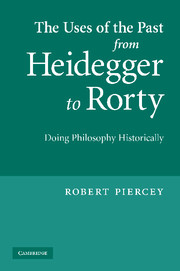Book contents
- Frontmatter
- Contents
- Acknowledgments
- List of abbreviations
- Introduction: The uses of the past
- 1 Doing philosophy historically
- 2 The role of narrative
- 3 Defending the historical thesis
- 4 The critical approach: MacIntyre
- 5 The diagnostic approach: Heidegger
- 6 The synthetic approach: Ricoeur
- Consequences
- References
- Index
Consequences
Published online by Cambridge University Press: 31 August 2009
- Frontmatter
- Contents
- Acknowledgments
- List of abbreviations
- Introduction: The uses of the past
- 1 Doing philosophy historically
- 2 The role of narrative
- 3 Defending the historical thesis
- 4 The critical approach: MacIntyre
- 5 The diagnostic approach: Heidegger
- 6 The synthetic approach: Ricoeur
- Consequences
- References
- Index
Summary
This book has argued that philosophy can be done historically. It has tried to explain what is involved in doing so, and it has learned about this enterprise by studying it in action. Now, to conclude, I would like to ask what all of this implies. What can we learn about philosophy from the fact that it may be done historically? How does this fact force us to rethink the nature of the discipline? These are large questions, and I cannot hope to say the last word about them here. But I would like to make some suggestions about how to begin thinking about them, suggestions that are best seen as signposts to further inquiry.
The general answer to all of these questions should already be familiar. The fact that philosophy can be done historically shows that the discipline is concerned not just with theories, but with pictures. Philosophers are not just in the business of giving specific, detailed answers to specific, detailed questions. They are also in the business of articulating, developing, and assessing pictures of reality, general conceptions of what the world is like and how we fit into it. This fact is not often recognized. We often describe philosophy with reference to theories and arguments alone, depicting it as a search for answers to perennial questions. But philosophy also strives to offer synoptic visions, comprehensive understandings of ourselves and our situation. Some of these visions prove better than others.
- Type
- Chapter
- Information
- The Uses of the Past from Heidegger to RortyDoing Philosophy Historically, pp. 206 - 211Publisher: Cambridge University PressPrint publication year: 2009



